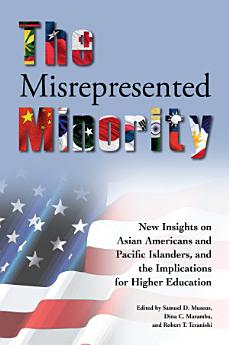The Misrepresented Minority: New Insights on Asian Americans and Pacific Islanders, and the Implications for Higher Education
Samuel D. Museus · Dina C. Maramba · Robert T. Teranishi
Jul 2023 · Taylor & Francis
Ebook
370
Pages
family_home
Eligible
info
reportRatings and reviews aren’t verified Learn More
About this ebook
While Asian Americans and Pacific Islanders (AAPIs) are growing faster than any other racial group in the U.S., they are all but invisible in higher education, and generally ignored in the research literature, and thus greatly misrepresented and misunderstood.This book presents disaggregated data to unmask important academic achievement and other disparities within the population, and offers new insights that promote more authentic understandings of the realities masked by the designation of AAPI. In offering new perspectives, conceptual frameworks, and empirical research by seasoned and emerging scholars, this book both makes a significant contribution to the emerging knowledge base on AAPIs, and identifies new directions for future scholarship on this population. Its overarching purpose is to provide policymakers, practitioners, and researchers in higher education with the information they need to serve an increasingly important segment of their student populations.In dispelling such misconceptions as that Asian Americans are not really racial minorities, the book opens up the complexity of the racial and ethnic minorities within this group, and identifies the unique challenges that require the attention of anyone in higher education concerned with student access and success, as well as the pipeline to the professoriate.
About the author
Samuel D. Museus is Assistant Professor of Educational Administration at the University of Hawaii at Manoa. His scholarship is focused on college success among underserved student populations. Specifically, his current research is aimed at understanding the role of institutional environments in minority college student adjustment, engagement, and persistence. He has produced over 100 journal articles, book chapters, and national conference presentations focused on understanding the institutional factors that shape the experiences and outcomes of racial/ethnic minority students. These include peer-reviewed articles accepted in The Review of Higher Education, Teachers College Record, the Journal of College Student Development, and the Journal of College Student Retention. His books include Using Qualitative Methods in Institutional Assessment (2007 with Shaun R. Harper) Conducting Research on Asian Americans in Higher Education (2009), Racial and Ethnic Minority Students' Success in STEM Education (2011 with Robert T. Palmer, Ryan J. Davis, and Dina C. Maramba), Using Mixed Methods to Study Intersectionality in Higher Education (Forthcoming, 2011 with Kimberly A. Griffin), and Creating Campus Cultures: Fostering Success among Racially Diverse Student Populations (Forthcoming, 2012 with Uma M. Jayakumar). Dina C. Maramba is an associate professor of higher education at Claremont Graduate University’s School of Educational Studies. She was previously an assistant and associate professor of student affairs administration and affiliate faculty of Asian and Asian American studies at the State University of New York (SUNY), Binghamton.Maramba’s research interests include access and success of underserved college student populations; Asian Americans/Pacific Islanders and Filipina/o Americans in higher education; equity, diversity, and social justice issues in higher education; the impact of college environments on students; and minority serving institutions. Her tea
Rate this ebook
Tell us what you think.
Reading information
Smartphones and tablets
Install the Google Play Books app for Android and iPad/iPhone. It syncs automatically with your account and allows you to read online or offline wherever you are.
Laptops and computers
You can listen to audiobooks purchased on Google Play using your computer's web browser.
eReaders and other devices
To read on e-ink devices like Kobo eReaders, you'll need to download a file and transfer it to your device. Follow the detailed Help Center instructions to transfer the files to supported eReaders.






